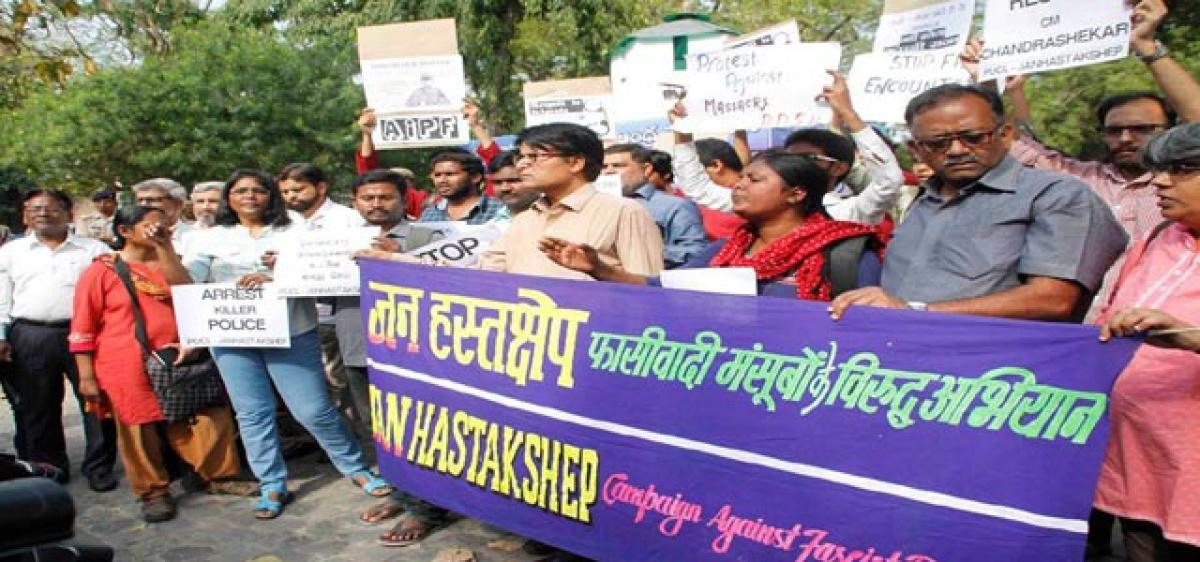Live
- Accused Sentenced to Life Imprisonment with Rigorous Punishment and Fined Rs. 25,000 for Murder
- ANR Centenary Celebrations Spread Across 31 Cities, Chiranjeevi to Receive ANR Award from Amitabh Bachchan
- Rahul Gandhi opposes quota abroad & violates Constitution: BJP MP
- Encounter breaks out in J&K’s Reasi
- RG Kar case: CBI custody of Sandip Ghosh, Abhijit Mondal extended till Sep 25
- J&K: Home Voting begins in all six Kathua Assembly segments
- Gurugram: Biker killed after being hit by SUV
- Bengal doctor’s body bars ex-member from all organisation activities over RG Kar case
- Centre and Seers serious over Tirumala Sacrilege
- LG ELECTRONICS ORGANIZES GRAND TECH SEMINAR IN HYDERABAD
Just In

“Whatever is my right as a man is also the right of another; and it becomes my duty to guarantee as well as to possess,” thus said Thomas Paine in ‘Rights of Man.’
“Whatever is my right as a man is also the right of another; and it becomes my duty to guarantee as well as to possess,” thus said Thomas Paine in ‘Rights of Man.’ He tenth of December of every year is observed as the Human Rights Day. It commemorates the day on which, in 1948, the United Nations General Assembly adopted the Universal Declaration of Human Rights (UDHR).
The UN has given a call to everyone to observe this year’s Human Rights Day, ‘to stand up for someone's rights’! The foundation of human rights is stated to be the human dignity. Dignity is being violated on several structural accounts such as caste, class, gender, religion, region etc.
The UDHR describes a set of fundamental moral rights and confers legal rights upon all human beings by virtue of their humanity. It recognises the interdependency of various rights’. Article 1 of the declaration states that, “all human beings are born free and equal in dignity and rights. They are endowed with reason and conscience and should act towards one another in a spirit brotherhood.”
Human rights organisations like Human Rights Watch and Amnesty International have been documenting human rights abuse in various parts of the world. In their observation, in India, there are severe human rights violations faced by various sections from the Indian state and the society.
According to the statistics released in August 2014, there were over 47,000 crimes committed against members of Scheduled Castes, and over 11,000 against members of Scheduled Tribes.
In July 2016 an official census stated that over 1,80,000 households were engaged in “manual scavenging”. New revelations by an investigative news website on six major incidents of violence against the Dalit community in the 1990s in Bihar state in which at least 144 people were killed by upper-caste militia triggered dismay over the hardships that the marginalised communities face in obtaining justice.
In August, village leaders in Uttar Pradesh state allegedly ordered the rape of two Dalit sisters to pay for the “sins” of their brother who had eloped with a higher-caste woman. There has been an increased attack on minorities in India, they observed that four Muslim men were killed by Hindu vigilante groups in separate incidents across the country in 2015 over suspicions that they had killed or stolen cows for beef.
A Delhi court in March acquitted all 16 policemen accused in the 1987 killing of over 40 Muslims during communal riots in Uttar Pradesh state, citing lack of evidence. In 2014 nearly 3,22,000 crimes against women, including over 37,000 cases of rape, were reported. In May 2015, the Cabinet cleared amendments to the prohibition of child labor law. If passed by parliament, could actually push more children into child labor.
A special report by the United Nations on extra-judicial, summary, or arbitrary executions noted that “impunity remains a serious problem” and expressed regret that India had not repealed or at least radically amended AFSPA. Extra judicial killings are precarious in states like Chhattisgarh, Jharkhand and Orissa in the name of eliminating Left Wing Extremism (LWE).
Statistics released in August showed that 93 cases of deaths and 197 cases of rapes in police custody were reported in 2014. In August, the National Human Rights Commission (NHRC) recorded 1,327 deaths in judicial custody between April 2014 and January 2015. Prolonged pre-trial detention and overcrowding in jails remained widespread. As of January, over 282,000 prisoners 68% of the total prison population were pre-trial detainees. Dalits, Adivasis and Muslims continued to be disproportionately represented.
In several cases, interest groups that claimed to be offended by books, movies, or works of art pushed for censorship or harassed authors. The government often allowed them a “heckler’s veto” rather than protecting those under attack. Overbroad and vaguely worded sedition, criminal defamation, and hate speech laws were used to harass and prosecute those expressing dissenting, unpopular, or minority views.
Authorities labeled activists “anti-national” when they questioned government infrastructure and development projects or sought justice for victims. It is the time for us to make regimes based on the moral standards that has been set by the Universal declaration of Human Rights. (The writer is an Assistant Professor, English & Foreign Languages University, Hyderabad)
By Dr Venkatesh Vaditya

© 2024 Hyderabad Media House Limited/The Hans India. All rights reserved. Powered by hocalwire.com







